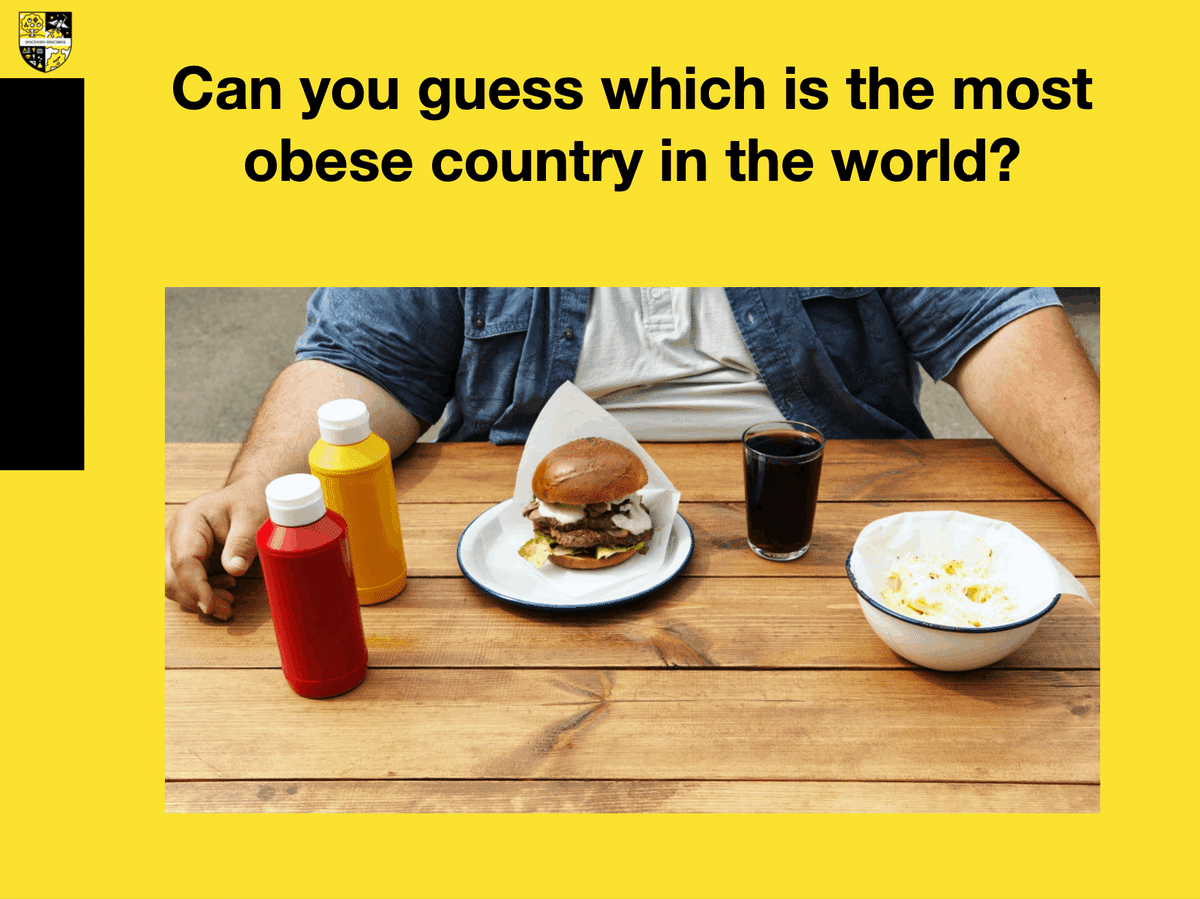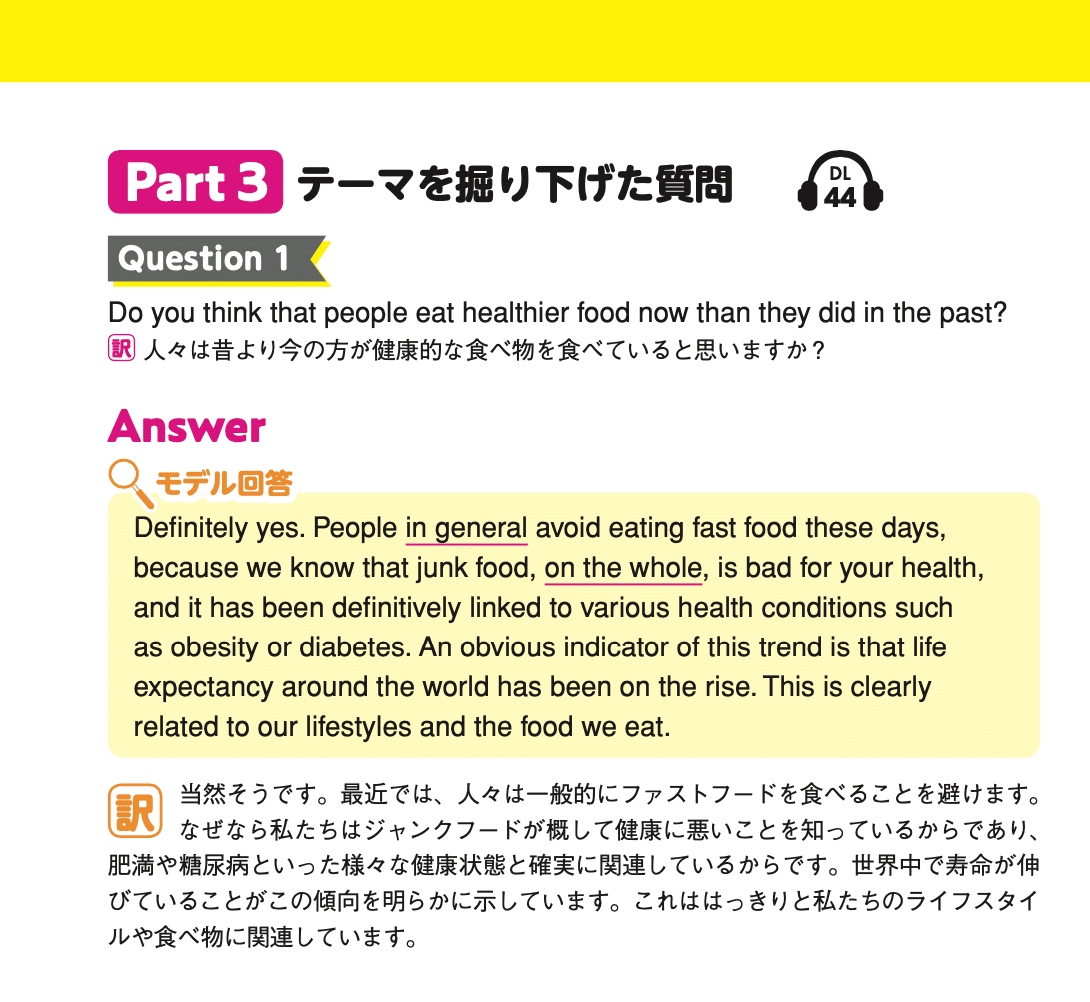
英単語研究:肥満
IELTSでは「背景知識」が合否を左右します。あらゆるテーマにおけるスキーマ理論(schema theory)でいうキャビネット形式に知識や情報を引き出すことで認知的負担(cognitive burden)を減らすことができます。今回は「肥満」に関する英語表現とIELTSの4技能対策教材をお届けします。連載中のJapan Times Alphaには収まりきらなかったネタをここに公開していきます。

LinguaHackers授業教材一部公開
まずは私が監修する中高生向けオンライン英語学習プログラムLinguaHackers(リンガハッカーズ)の週1回の対話型スピーキング授業で実際に使用されているオリジナル教材の一部を公開します。英語検定準1級とIELTS6.0取得を目指す全国の中高生がこの教材を使って週1回英語で議論しています。
全国の小中高生向けオンライン英語学習プログラムLinguaHackersの特徴
— 嶋津 幸樹/ Koki Shimazu (@Koki_Shimazu) January 12, 2022
✅英検準1級&IELTS6.0目標
✅国内大学・海外大学受験対応
✅IELTS7.0以上のメンターが伴走
✅週1回の対話型スピーキング授業
✅週1回のオリジナル英語学習教材配信
✅月2回の嶋津による視聴型ライブ授業https://t.co/DnT4adWAHm pic.twitter.com/y9Cr56Tf2c



https://en.wikipedia.org/wiki/List_of_countries_by_obesity_rate



https://borgenproject.org/obesity-in-the-pacific-islands/




「肥満」に関する英単語
stroke(発作)
cancer(癌)
diabetes(糖尿病)
depression(鬱病)
overweight(太り過ぎの)
hypertension(高血圧症)
confectionary(菓子類)
「肥満」に関するコロケーション
gain weight(太る)
loose weight(痩せる)
risk factor(リスク要因)
heart disease(心臓病)
low self-esteem(低い自尊心)
social isolation(社会的孤立)
essential nutrients(必要な栄養)
chronic malnutrition(栄養失調)
people with obesity(肥満体の人々)
nutritious vegetables(栄養がある野菜)
tend towards obesity(太り過ぎの傾向がある)
sedentary lifestyles(座りがちな生活スタイル)
contain high amounts of fat(脂肪分を多く含む)
tend towards childhood obesity(幼少期の肥満傾向にある)
obesity and high blood pressure in children(子どもの肥満と高血圧)
「肥満」に関する例文
Twenty percent of children in England are obese.
「イギリスの 20% の子どもは肥満である。」
A vegetarian lifestyle can benefit our health.
「ベジタリアンのライフスタイルは私たちの健康に恩恵をもたらす。」
Becoming a vegetarian can play a pivotal role in protecting the lives of animals.「ベジタリアンのライフスタイルは私たちの健康にも良い影響を与える。」
Parents offer candy even though they know that candy can cause obesity and tooth damage.「親は飴が肥満や歯の損傷の原因になることを知っていても、飴を与えてしまう。」
Television has often been accused of promoting obesity and aggression in the young.(名古屋大学)「テレビは若者たちの肥満や攻撃性を促進するとよく非難されてきた。」
「肥満」に関する外部リソース
Obesity is responsible for 4.7 million premature deaths each year
Obesity – defined as having a high body-mass index – is a risk factor for several of the world’s leading causes of death, including heart disease, stroke, diabetes and various types of cancer. Obesity does not directly cause of any of these health impacts but can increase their likelihood of occurring. In the chart we see that it is one of the leading risk factors for death globally.

8% of global deaths are the result of obesity
Globally, 8% of deaths in 2017 were the result of obesity – this represents an increase from 4.5% in 1990. This share varies significantly across the world. In the map here we see the share of deaths attributed to obesity across countries.
Across many middle-income countries – particularly across Eastern Europe, Central Asia, North Africa, and Latin America – more than 15% of deaths were attributed to obesity in 2017. This most likely results from having a high prevalence of obesity, but poorer overall health and healthcare systems relatively to high-income countries with similarly high levels of obesity.
In most high-income countries this share is in the range of 8 to 10%. This is about half the share of many middle-income countries. The large outliers among rich countries are Japan and South Korea: there only around 5% of premature deaths are attributed to obesity.
Across low-income countries – especially across Sub-Saharan Africa – obesity accounts for less than 5% of deaths.

IELTSライティングに挑戦!
こちらはJapan Times Alphaに掲載した解答例です。
Obesity is one of the world’s leading killers. Responsible for 5 million annual deaths worldwide, the problem continues to grow as food becomes more readily available at all income levels. Diabetes, heart disease and hypertension are some serious health issues directly caused by obesity. Obesity is the highest of four categories on the BMI scale, which measures body mass index. Although ‘healthy’ is the target range, around two-thirds of adults are ‘overweight’ or ‘obese’ in most developed countries. Even more concerning is the prevalence of childhood obesity. Without a concerted global effort, obesity will soon become a public health crisis.
「肥満は世界の主要な死因の一つです。世界中で年間500万人が死亡しており、この問題は、あらゆる所得水準で食物がより容易に入手できるようになるにつれて、拡大し続けています。糖尿病、心臓病、高血圧症は、肥満が直接原因となる深刻な健康問題です。肥満とは体格指数を表すBMIスケールで、4つのカテゴリーのうち最も高いものです。健康が目標範囲とされていますが、ほとんどの先進国では成人の約3分の2が「過体重」または「肥満」です。さらに懸念されるのは、小児肥満の蔓延です。世界的な取り組みがなければ、肥満はやがて公衆衛生の危機となることでしょう。」
IELTSスピーキングに挑戦!


IELTSリスニングに挑戦!
IELTSリーディングに挑戦!
Section 3 Questions 27 - 40
You should spend about 20 minutes on questions 27 - 40, which are based on Reading Passage 3 below.
A Weighty Problem
Obesity, one of the fastest growing illnesses in the world today, is one that, in the most part, is entirely self-inflicted. It is nearing epidemic proportions with one in five people now officially dangerously overweight in Britain and unless this trend is checked, this figure is expected to rise to one in four by 2010, a figure comparable to the US where a quarter of the population is obese. The consequences of this illness spreading so rapidly affects not just the physical health of the nation but has a psychological and economic impact on the well being of the country.
According to the National Audit Office (NAO), the results of a survey conducted into the lifestyles of the British revealed these alarming statistics. It was found that 21% of women and 17% of men were regarded as being obese whilst another 32% of women and 46% of men were overweight with no sign that this trend will cease. The situation has worsened dramatically since the 1980s when only 6% of women and 8% of women were overweight. What this means is that today nearly twenty million people in Britain should alter their way of eating and adopt healthier eating patterns.
The most obvious consequence of the increase in obesity is the lowering of the quality of life for those overweight, They are more likely to suffer from type 2 diabetes, arthritis, kidney failure and risk developing heart disease and some forms of cancer. According to Rod Prideaux of the NAO, more than 31,000 people are dying prematurely every year due to obesity. Along with health health problems the obese have to cope with psychological difficulties. They often experience lower self-esteem and have a more negative self-image as they are often the focus of offensive jibes from thinner people. This can lead to agoraphobia, self-imposed isolation from society and less success in their careers and personal lives.
An additional detrimental consequence of obesity is the economic cost to the nation. Stephen Morris of City University found that the total expenditure on treating the consequences of obesity amounted to four hundred and seventy million pounds, there were eighteen million days of absenteeism because of ill health and lost earnings due to morbidity, resulting in a decline in productivity, accounted for nearly one and a half million pounds in 1998.
Perhaps the most worrying aspect in the change in dietary habits is the startling rise in childhood obesity over the past twenty years. Prof Andrew Prentice of the London School of Hygiene and Tropical Medicine warned parents that if childhood obesity continues to grow at the current rate, then many parents will find their children dying before they do. This change is partly due to a highly calorific diet full of fatty foods and sweetened drinks and partly to the increasingly sedentary lifestyle of the young. TVs in bedrooms have been blamed for the lack of interest in sporting activities in the young. Indeed, Hugh Crombie of the Health Development Agency has found that a worrying number of under 5s don't even realise that walking is a form of transport but, as car journeys to schools have tripled in the past twenty years and fewer than 5% of children walk to school, this is hardly a surprising revelation. Fatter children are subjected to bullying, depression and some even have suicidal tendencies. Dr Laurel Edmunds of Oxford University notes that overweight children may also be labelled as immature or disruptive when they are behaving normally for their age as their appearance, due to their size, is up to three years older. Also, according to Dr John Reilly of Glasgow University, obese children have poorer social, educational and economic prospects in adulthood than their slimmer counterparts.
So how can this trend be reversed? That exercise be encouraged in both children and adults is highly recommended to offset the sedentary lifestyle of today. George Davey Smith of Bristol University believes that social class affects the level of physical activity in adults with females in non-manual occupations more likely to take up physical leisure activities but this is counterbalanced by occupational activity by those engaged in manual employment. Also, a change in diet to include more fresh fruit and vegetables and low fat foods is generally thought to be effective in weight control.
But not everyone sees these recommendations as a solution. The psychotherapist, Susie Orbach, believes that encouraging parents to alter their children's diets causes them anxiety which is then transferred to their offspring. This may draw the children to the food the parents want them to avoid as the added anxiety causes them to seek emotional comfort often in the form of junk food. Professor Jane Wardle suggests that health messages can be counterproductive as if you offer a child a novel food with a health warning, it will rate the food as less desirable than exactly the same food without the warning. Paul Gatley, co-founder of the Carnegie International Camp for overweight children, puts the success of his programme down to its philosophy of advocating that children's weight will only be controlled if the reasons why they want to eat are understood. His camp deals not only with diet but gives advice on how to cope with bullying as well as encouraging children to take up sport on a permanent basis and for fun rather than for health considerations.
One obstacle in the battle for weight control is the massive food industry, which actively encourages the over consumption of foods high in fat and sugar. It bombards the public with advertisements for their products and about 90% of commercials during children's television hour are for sugary drinks and food stuffs. Dr Susan Jebb is also worried about the trend towards the production of king sized bags of crisps and chocolate bars. "These are attractive to poorer families as you get more food for the same price. But if you put a big bag of crisps in your child's lunchbox, do they save half for the next day? Of course not."
Even if salaries and the standard of living have improved in the last fifty years, are we really benefiting if at the same time our health is deteriorating from excessive eating and drinking? It has been asserted that rationing after the second world war was more preferable than the twenty-first century snack culture, where youngsters are suffering from the nutritional equivalent of the Victorian ear when scurvy and rickets were commonplace. But happily not all fatter people are depressed and stressed, According to a report by the Nobel prizewinning geneticist, James Watson, increased fat levels produce more endorphins, a natural mood-enhancing chemical and from this he concluded that plumper people are happier than their slimmer peers. So, the adage that you can never be too rich or too thin does not apply to everyone.
Questions 27 - 35
Classify the following statements as referring to
A Rod Prideaux E Dr Laural Edmunds I Prof Jane Wardle
B Stephen Morris F Dr John Reilly J Paul Gatley
C Prof Andrew Prentice G George Davey Smith K Dr Susan Jebb
D Hugh Crombie H Susie Orbach L James Watson
Write the appropriate letters A - L in boxes 27 - 35 on your answer sheet.
27 Being overweight does not have negative consequences.
28 Obese children will endure social deprivations in later years.
29 Obesity is the cause of the early demise of many people
30 Some parents will outlive their children.
31 Obese children are categorised unfairly.
32 Recent developments in food marketing will encourage obesity.
33 Children must be helped to deal with the problems of coping with obesity.
34 The amount of extra exercise taken depends on professional status.
35 Children react negatively when given advice by adults.
Questions 36 - 40
Do the following statements agree with the information given in Reading Passage 3? In boxes 36 - 40 on your answer sheet write
YES if the statement agrees with the information
NO if the statement contradicts the information
NOT GIVEN if there is no information on this in the passage
36 Most children have TVs in their bedrooms.
37 Young children never walk to school
38 Children today suffer from scurvy and rickets.
39 In general obese people do not estimate themselves highly.
40 Parents can inadvertently pass their fears onto their children.
引用:新东方在线 [www.koolearn.com] 网络课堂电子教材系列
この記事が気に入ったらサポートをしてみませんか?
